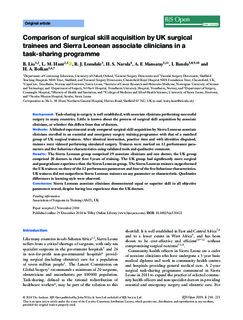Comparison of surgical skill acquisition by UK surgical trainees and Sierra Leonean associate clinicians in a task-sharing programme
Liu, Ben; Hunt, Lesley; Lonsdale, Robert J; Narula, Harjeet; Manasrey, Alieu; Bundu, Ibrahim; Bolkan, Håkon Angell
Journal article, Peer reviewed
Published version

Åpne
Permanent lenke
http://hdl.handle.net/11250/2616687Utgivelsesdato
2018Metadata
Vis full innførselSamlinger
- Institutt for klinisk og molekylær medisin [3501]
- Publikasjoner fra CRIStin - NTNU [37962]
- St. Olavs hospital [2490]
Sammendrag
Background
Task‐sharing in surgery is well established, with associate clinicians performing successful surgery in many countries. Little is known about the process of surgical skill acquisition by associate clinicians, or whether this differs from that of doctors.
Methods
A blinded experimental study compared surgical skill acquisition by Sierra Leonean associate clinicians enrolled in an essential and emergency surgery training programme with that of a matched group of UK surgical trainees. After identical instruction, practice time and with identities disguised, trainees were videoed performing simulated surgery. Trainees were marked on 12 performance parameters and five behaviour characteristics using validated tools and qualitative comment.
Results
The Sierra Leonean group comprised 19 associate clinicians and one doctor; the UK group comprised 20 doctors in their first 5 years of training. The UK group had significantly more surgical and postgraduate experience than the Sierra Leonean group. The Sierra Leonean trainees outperformed the UK trainees on three of the 12 performance parameters and four of the five behaviour characteristics. UK trainees did not outperform Sierra Leonean trainees on any parameter or characteristic. Qualitative differences in learning style were observed.
Conclusion
Sierra Leonean associate clinicians demonstrated equal or superior skill in all objective parameters tested, despite having less experience than the UK doctors.
